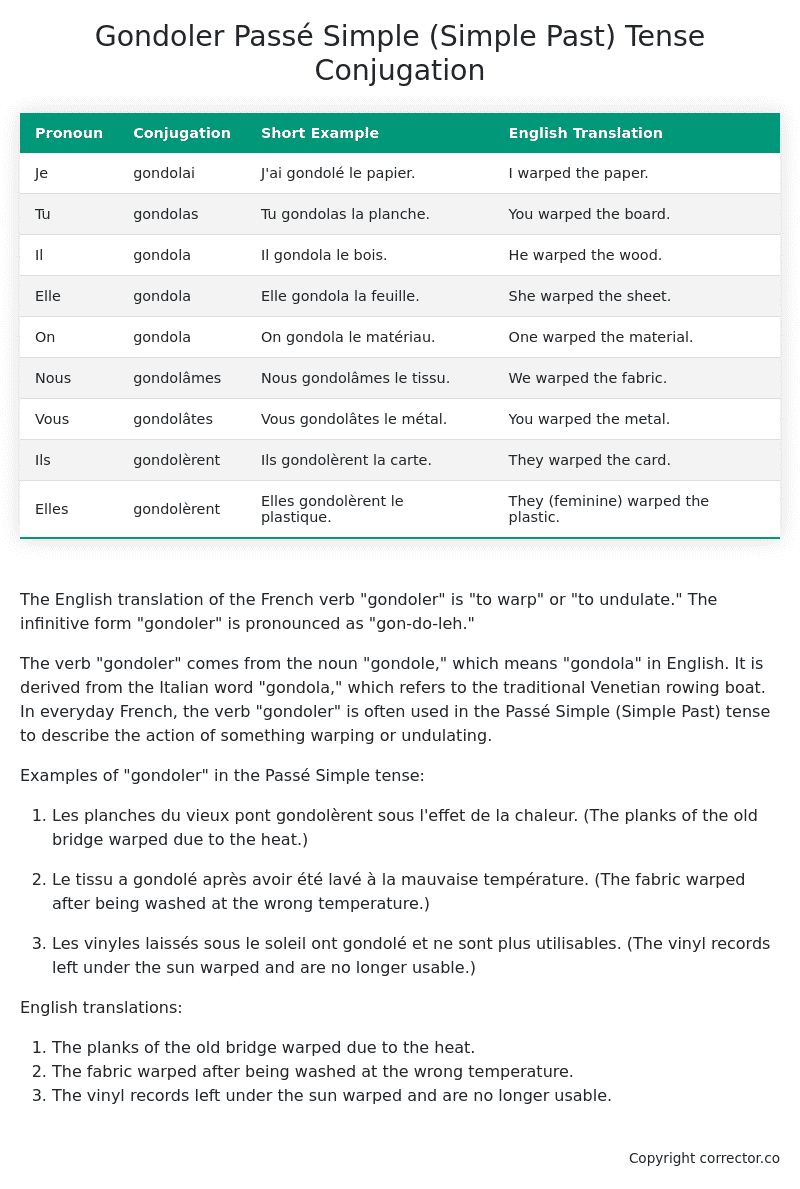Passé Simple (Simple Past) Tense Conjugation of the French Verb gondoler
Introduction to the verb gondoler
The English translation of the French verb “gondoler” is “to warp” or “to undulate.” The infinitive form “gondoler” is pronounced as “gon-do-leh.”
The verb “gondoler” comes from the noun “gondole,” which means “gondola” in English. It is derived from the Italian word “gondola,” which refers to the traditional Venetian rowing boat. In everyday French, the verb “gondoler” is often used in the Passé Simple (Simple Past) tense to describe the action of something warping or undulating.
Examples of “gondoler” in the Passé Simple tense:
-
Les planches du vieux pont gondolèrent sous l’effet de la chaleur.
(The planks of the old bridge warped due to the heat.) -
Le tissu a gondolé après avoir été lavé à la mauvaise température.
(The fabric warped after being washed at the wrong temperature.) -
Les vinyles laissés sous le soleil ont gondolé et ne sont plus utilisables.
(The vinyl records left under the sun warped and are no longer usable.)
English translations:
- The planks of the old bridge warped due to the heat.
- The fabric warped after being washed at the wrong temperature.
- The vinyl records left under the sun warped and are no longer usable.
Table of the Passé Simple (Simple Past) Tense Conjugation of gondoler
| Pronoun | Conjugation | Short Example | English Translation |
|---|---|---|---|
| Je | gondolai | J’ai gondolé le papier. | I warped the paper. |
| Tu | gondolas | Tu gondolas la planche. | You warped the board. |
| Il | gondola | Il gondola le bois. | He warped the wood. |
| Elle | gondola | Elle gondola la feuille. | She warped the sheet. |
| On | gondola | On gondola le matériau. | One warped the material. |
| Nous | gondolâmes | Nous gondolâmes le tissu. | We warped the fabric. |
| Vous | gondolâtes | Vous gondolâtes le métal. | You warped the metal. |
| Ils | gondolèrent | Ils gondolèrent la carte. | They warped the card. |
| Elles | gondolèrent | Elles gondolèrent le plastique. | They (feminine) warped the plastic. |
Other Conjugations for Gondoler.
Le Present (Present Tense) Conjugation of the French Verb gondoler
Imparfait (Imperfect) Tense Conjugation of the French Verb gondoler
Passé Simple (Simple Past) Tense Conjugation of the French Verb gondoler (You’re reading it right now!)
Passé Composé (Present Perfect) Tense Conjugation of the French Verb gondoler
Futur Simple (Simple Future) Tense Conjugation of the French Verb gondoler
Futur Proche (Near Future) Tense Conjugation of the French Verb gondoler
Plus-que-parfait (Pluperfect) Tense Conjugation of the French Verb gondoler
Passé Antérieur (Past Anterior) Tense Conjugation of the French Verb gondoler
Futur Antérieur (Future Anterior) Tense Conjugation of the French Verb gondoler
Subjonctif Présent (Subjunctive Present) Tense Conjugation of the French Verb gondoler
Subjonctif Passé (Subjunctive Past) Tense Conjugation of the French Verb gondoler
Subjonctif Imparfait (Subjunctive Imperfect) Tense Conjugation of the French Verb gondoler
Subjonctif Plus-que-parfait (Subjunctive Pluperfect) Tense Conjugation of the French Verb gondoler
Conditionnel Présent (Conditional Present) Tense Conjugation of the French Verb gondoler
Conditionnel Passé (Conditional Past) Tense Conjugation of the French Verb gondoler
Conditionnel Passé II (Conditional Past II) Tense Conjugation of the French Verb gondoler
L’impératif Présent (Imperative Present) Tense Conjugation of the French Verb gondoler
L’impératif Passé (Imperative Past) Tense Conjugation of the French Verb gondoler
L’infinitif Présent (Infinitive Present) Tense Conjugation of the French Verb gondoler
L’infinitif Passé (Infinitive Past) Tense Conjugation of the French Verb gondoler
Le Participe Présent (Present Participle) Tense Conjugation of the French Verb gondoler
Le Participe Passé (Past Participle) Tense Conjugation of the French Verb gondoler
Struggling with French verbs or the language in general? Why not use our free French Grammar Checker – no registration required!
Get a FREE Download Study Sheet of this Conjugation 🔥
Simply right click the image below, click “save image” and get your free reference for the gondoler Passé Simple tense conjugation!

Gondoler – About the French Passé Simple (Simple Past) Tense
Formation
Usage
Narration
Historical Context
Interactions with other tenses
Passé Composé
Imparfait
Conditional and Subjunctive
Summary
I hope you enjoyed this article on the verb gondoler. Still in a learning mood? Check out another TOTALLY random French verb conjugation!


